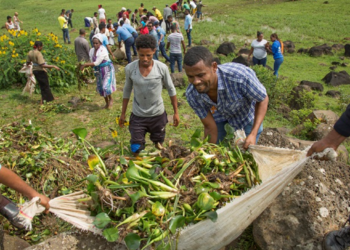Hemp as a potential ingredient for salmon feed – Rare Earth Global, a company engaged in the development of sustainable industrial hemp products, has received funding from the UK Seafood Innovation Fund (SIF) for a large-scale research and development project. The project aims to explore the inclusion of hemp seed in the diet of farmed salmon in Scotland, with the objective of assessing commercial viability and nutritional benefits.
Preliminary studies have shown that hemp meal offers a comparable nutritional profile to soybean and fish meal, the most common protein sources for salmon feed.
The project, which also involves the Sustainable Aquaculture Innovation Centre (SAIC) and the Institute of Aquaculture at the University of Stirling, has the support of Mowi, a global producer of Atlantic salmon.
The objectives of the study include evaluating hemp meal protein for commercial inclusion in salmon diets and identifying an optimal composition for maximum nutritional value. Secondary ingredients used in the food will also be tested.
Another key aspect of the project concerns sustainability. Methods will be found to measure the carbon footprint of the entire process, involving hemp farmers, feed companies and fish producers.
Suneet Shivaprasad, director and co-founder of Rare Earth Global, says he is optimistic about the positive results of the previous feasibility study and the potential of hemp flour as a main ingredient in aquaculture feed. The company is committed to sustainable agriculture with a zero-waste approach, using every part of the hemp plant.
Collaboration with agricultural cooperatives and family farms in different regions of the UK will enable Rare Earth Global to develop supplies of the raw material across the country.
The Hemp-30 strategy
The UK government has published the Hemp-30 strategy, which aims to make industrial hemp a major crop in the country. This initiative is expected to contribute significantly to the UK economy and reduce carbon dioxide emissions.
The project researchers are confident of demonstrating the validity of hemp protein as a direct substitute for soya in terms of digestibility, nutrition and salmon growth. Locally grown plant-based ingredients have a positive impact on the environment and offer opportunities to reduce dependence on imported ingredients and improve the overall environmental impact of aquaculture.
The project receives positive praise from researchers, who highlight the potential to develop new sustainable supply chains in the UK and to collaborate with key players in the industry to turn innovative ideas into reality. The use of hemp in aquaculture feed could contribute significantly to the economy and sustainability of the fisheries sector.
Hemp as a potential ingredient for salmon feed









